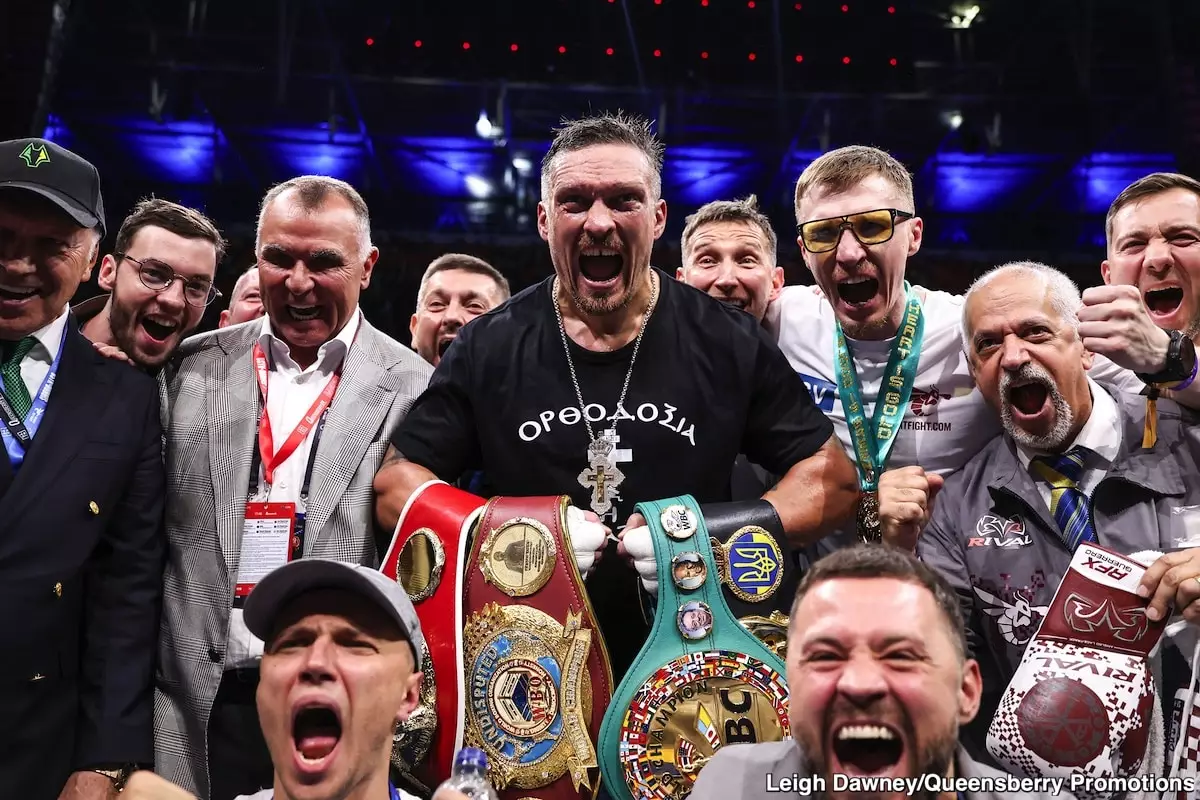Oleksandr Usyk’s ascent through the boxing ranks has been nothing short of revolutionary. Unlike many fighters who chase fleeting fame or superficial titles, Usyk has set a standard that elevates the sport itself. His journey from dominating the cruiserweight division to establishing himself as the indisputable heavyweight king represents more than just a career—it’s a blueprint for modern greatness. His methodical dismantling of opponents, unwavering focus, and strategic mastery redefine what it means to be a true champion in boxing’s multi-belt era.
Labeled initially as too small for heavyweight, Usyk transformed skepticism into admiration with his technical brilliance. Moving up in weight, he faced and defeated the likes of Anthony Joshua twice—often considered one of the most formidable heavyweights of his generation. Then, in a shift that cemented his status as an all-time great, Usyk took Tyson Fury’s undefeated record and held all the heavyweight belts, a feat few can even aspire to. When he vacated a title just to reclaim it by knocking out Daniel Dubois again, he demonstrated not only strategic cunning but an insatiable desire for legacy-building rather than fleeting glory.
What makes Usyk’s career truly remarkable is his ability to succeed without the noise, protection, or favoritism that often clouds the sport. He traveled abroad to beat champions in their own backyards—from Latvia to Russia, Poland, and Germany—proving that skill and heart can triumph over the convenience of home advantage. His knockout of Daniel Dubois was not merely a victory; it was a statement of dominance—an assertion that age, size, and hype matter little when faced with relentless precision and intelligence in the ring.
The Obstacles and the Illusion of Contenders
Critics often cling to the hope of finding an opponent capable of unseating a legend like Usyk, but the reality is stark. The purported “next opponents”—Zhilei Zhang, Filip Hrgovic, Arslanbek Makhmudov, Joseph Parker—are either slow, predictable, or fundamentally ill-equipped to teeter on the brink of victory against the Ukrainian maestro. Zhang, slow and lumbering, can threaten briefly but cannot withstand Usyk’s tactical acuity. Hrgovic, stiff and predictable, has shown limitations that Usyk would exploit with ease. Makhmudov’s raw power lacks the defensive skills necessary to survive Usyk’s footwork and technical finesse. Parker, fondly regarded as a solid professional, would be treated as a sparring partner rather than a challenger—his limitations in speed and reflexes making him ill-prepared for the relentless dance of Usyk’s movement.
Perhaps most telling is the lack of a true blueprint to beat Usyk. Fighters who rely on punch volume, raw power, or size are systematically nullified by his defensive intelligence and footwork. Tyson Fury, the only one who posed a significant challenge, did so because of his size and skill—yet even Fury has yet to truly solve the puzzle that Usyk presents. The fight that could offer a realistic challenge—Joe Joyce, known for his relentless pressure—would likely resemble a masterclass in footwork and tactical boxing rather than a brawl.
The Question of What’s Next for a Phenomenon
Now at 37, Usyk’s portfolio of accomplishments demands a new level of respect and opportunity. But beneath the accolades lies a question: why should he continue to chase opponents that do not elevate his legacy further? He’s already taken on the toughest challengers, conquered multiple divisions, and done so with an elegance that few can match. He has amassed a flawless undefeated record, won Olympic gold, fought in every significant fight at cruiserweight, and then dominated the primary heavyweights of his era.
The temptation for another big payday against Tyson Fury or a megafight in Saudi Arabia is undeniable, but Usyk’s value isn’t just monetary; it’s historical. His fight resume surpasses many legends, and his approach—all skill, tactical precision, and quiet confidence—sets him apart from the hype-driven nature of modern boxing. Yet, the industry seems content to keep him retreading the same opponent pools, defending minor titles, and waiting for the next payday. That approach undervalues what he truly represents: a once-in-a-generation talent.
For Usyk, continuing to fight without the guarantee of legacy-defining bouts diminishes the very essence of his career. If promoters and networks aren’t willing to match him against the top echelon—fighters who can test his technical artistry—then perhaps the best move is to step away at the peak of his powers. To keep fighting just for the sake of defense or incremental titles would be a disservice to his legacy as a revolutionary strategist rather than a mere champion.
His Legacy: Resilient, Flawless, Unmatched
Usyk’s story isn’t just about titles—it’s a testament to resilience and IQ. Moving beyond hype, he’s proven that brilliance, discipline, and tactical mastery can elevate a fighter to greatness. His record speaks for itself: undefeated, with victories over giants of the sport, and an ability to adapt and excel at every level. Unlike fighters who rely on brute strength or popularity, Usyk’s greatness stems from a relentless pursuit of perfection.
In an era where trash talk and spectacle often overshadow substance, Usyk quietly rewrites the script of what it takes to be a true champion. His skill set is unparalleled; his ring IQ, a rare commodity in contemporary boxing, makes him a living thesis on how to master the sport. For those who understand the deeper art of boxing, he is not just a champion but a paradigm shift—an artist who turns pure technique into once-in-a-lifetime spectacle.
The question now isn’t whether Usyk can add more titles or fights—he already has a legendary resume to stand alongside the all-time greats. The real question is whether boxing recognizes that standing still in the wake of his accomplishments is the greatest disservice of all. Usyk’s greatness isn’t chasing history; he already embodies it. The sport’s future depends on acknowledging this truth and allowing him to fight on his terms—or taking a bow when the sheer weight of his legacy becomes inevitable.


Leave a Reply